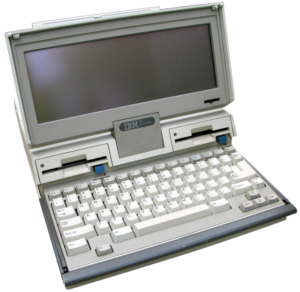Posted on September 6, 2018
IBM PC Convertible 5140
In 1986, IBM shed the light on the IBM PC convertible. Lighter and smaller than the IBM PC portable, this new device set the tone for generations to come, and is in fact IBMs first ever laptop computer.
Quick Links:
Historic Overview
Just two years aftet the IBM PC portable, IBM introduced the PC convertible, which took upfront developments and refinments seen in later generations.

This device marked many technology advancements for IBM, as it was the first to use the newly deviced manufacturing process for logic boards using surface-mount components. It was also the first IBM computer to be equipped with two 720 KIB 3.5 floppy drives by default. And it was the first that could run off batteries, supporting power management functions, so the system could essentially be put to sleep and resume from its last state. This was made possible by using a special version of the Intel 80C86, which had a static core. Suspending would essentially simply halt the CPU clock, and resume the clock if powered up again. This would of course only work while connected to a fixed power source, or while running off a charged battery.
The PC convertible also sort-of took upfront the docking idea. Essentially, the built-in display could be easily detached from the base unit. With the LCD detached, the base unit could be put under a regular size CRT monitor, still allowing to use the built-in keyboard. One would prefer to use a CRT anyway, as the built-in LCD offers only a skeewed resolution and doesn’t offer good readibility.
The PC convertible is expandable, but uses proprietary modules, which snap to the backside. Besides the two floppy drives no option for a built-in hard drive was given. Also, no standard-type connectors for serial and parallel ports exist, these had to be added using a proprietary expansion module. This imposed quiet a lock-in to the users, as they couldn’t expaned the unit with off-the-shelf components.
Although the PC convertible didn’t officially belong to IBMs PS/2 line, its design closely resembles the later PS/2 design. And so it was propably also doomed by the very same decision to put a lower-end CPU into the PS/2 machines. As history has it, the PS/2s where crippled in order to not jeopardize IBMs mainframe division by offering only less powerful machines into the mass market.
This widely opened the door to clone vendors, as they where of course not bound to this artificial restriction. In fact, the IBM PC convertible, apart from it’s form factor, power management, and better portability, didn’t offer much difference to it’s predecessor, the IBM PC portable. Yes, it was lighter, it was less bulky, but performance-wise, it was pretty much the same computer at its heart.
Essentially, IBM drove their own customers away by forcing users into buying proprietary expansion modules, yet offering sub-par performance at a rather high premium, while competing against better and less expensive clones at the same time. So despite some innovative features, the IBM PC convertible is generally considered a market failure.
Specs
The PHINTAGE Collection currently holds an IBM PC convertible.
| Vendor | International Business Machines Corporation |
| Model | PC convertible 5140 |
| Released | 1986 |
| Original Streetprice | 2000 US$ |
| Weight | 5.7 KG |
| Dimensions | |
| Builtin Display | Yes, monochrome 80×25 lines LCD |
| Builtin Battery | Yes |
| CPU | Intel 80C88 @ 4.77 MHz |
| RAM | 640 KiB |
| Storage |
|
| Network Support | no |
| USB | no |
| Video Output | yes (via expansion module adapter) |
| Other | 1 proprietrary expansion port connector on the back |
| Operating System | IBM PC-DOS |
| Overall Condition |
|
| Restoration Parts needed |
|
Gallery
Coming soon.
Downloads
There is no downloads currently in this section.

Hi I found a IBM 5140 in the trash. I am not sue if it works or not. But I would like to restore is there any data sheets and or replacement parts that I can purchase? If you can give me any information to put me on the right tack I would really appreciate it and be great ful. Thank you.
Hi Samuel,
A good resource may be https://www.ibm-pc.se.
Regards,
-GP